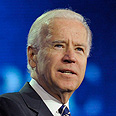
Biden, Kerry urge Senate to hold off on new Iran sanctions
Vice president, secretary of state try to persuade lawmakers to hold off on any more sanctions, and let nuclear talks unfold as new round of negotiations in Geneva set to begin next week
Vice President Joe Biden led a high-powered delegation to Capitol Hill on Thursday to try to persuade US lawmakers to hold off on any more sanctions against Iran and let delicate diplomatic talks over Tehran's nuclear program unfold.
President Barack Obama is convinced that there is the potential for an international deal to prevent Iran from developing a nuclear weapon but worries that congressional pressure for additional sanctions could complicate negotiations.
Related stories:
- Biden: Nuclear Iran dangerous to Israel
- Biden: Jewish leaders drove gay marriage changes
- Biden: Romney wants war with Syria, Iran
Biden, Secretary of State John Kerry and Treasury Secretary Jack Lew held a closed-door session with Senate Democratic leaders and Republican and Democratic members of the Senate Banking Committee to update them on major power talks with Iran. A new round of negotiations is set for next week in Geneva.
An official in Biden's office said the administration's message was that there may come a point when more sanctions are needed, but now may not be the best time for Congress to act.
But the appeal to wait is a tough sell in Congress, which tends to take a harder line on Iran than the administration. Several lawmakers said after the meeting they had not been convinced, and that fresh sanctions are needed to discourage Tehran's nuclear ambitions.
"I'm not ready to commit" to further delay, Robert Menendez, chairman of the Senate Foreign Relations Committee and a member of the Banking Committee, told reporters.
Republican Senator Mark Kirk, who strongly opposes any move to hold off on sanctions, said that if the banking committee delays its vote, he would seek to add more Iran sanctions to a defense authorization bill that could come to the Senate floor in November.
Others said they were more open to the appeal for a delay.
"I am mindful of the fact that maybe these discussions will bear fruit, and so we'll see," Republican Senator Mike Johanns said, although he added that any delay would not be long.
Democratic Senator Tim Johnson, chairman of the Banking Committee, said he had not yet decided whether to put off the committee's vote on new sanctions again. The banking panel, which has jurisdiction over sanctions bills, has delayed the measure from September at the administration's request.
Meanwhile, Secretary of Defense Chuck Hagel addressed an Anti-Defamation League conference in New York and conveyed Washington's determination to prevent a nuclear Iran. "We understand why this is so important to so many people. Because we’ve all been to Yad Vashem," he said. "Preventing Iran from obtaining a nuclear weapon is a common security interest."
He further added, "The United States is presently testing Iranian intentions for a diplomatic solution. As we engage Iran along with our partners, we are very clear-eyed about the reality in the Middle East. Iran is a state sponsor of terror, responsible for spreading hatred and extremism throughout the region.
"But foreign policy is not a zero-sum game. If we can find ways to resolve disputes peacefully, we are wise to explore them."
Addressing critics of the Obama policy he said, "Engagement is not appeasement, nor is it containment. We know what those are, we know where they lead, and we will not pursue them. "
No open-ended delay
Congress is weighing increasing sanctions to try to apply more pressure on Iran, which has uranium and plutonium programs that Western officials say are aimed at producing nuclear arms. Iran denies the accusations.
Administration officials argue that the current sanctions regime has had the desired effect, with new Iranian President Hassan Rohani, a presumed moderate, seeking a deal to ease them and fulfill a campaign promise to improve the Iranian economy.
Sanctions imposed last year by Washington and the European Union have combined to slash Iran's oil exports by roughly 1 million barrels a day, depriving Tehran of billions of dollars of income and driving up inflation and unemployment.
The official in Biden's office said existing sanctions have "gotten us to where we are today, to have the opportunity to test Iranian intentions to seek an enduring diplomatic solution."
"No one is suggesting an open-ended delay for new sanctions, and there may come a point where additional sanctions are necessary," the official said, but Congress should reserve its ability to legislate when it is most effective.
"The window for negotiation is limited, and if progress isn't made, there may be a time when more sanctions are in fact necessary. We have always said that there would be no agreement overnight and we've been clear that this process is going to take some time," the official said.
Yitzhak Benhorin contributed to this report
- Receive Ynetnews updates directly to your desktop










